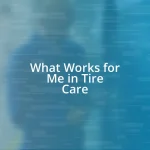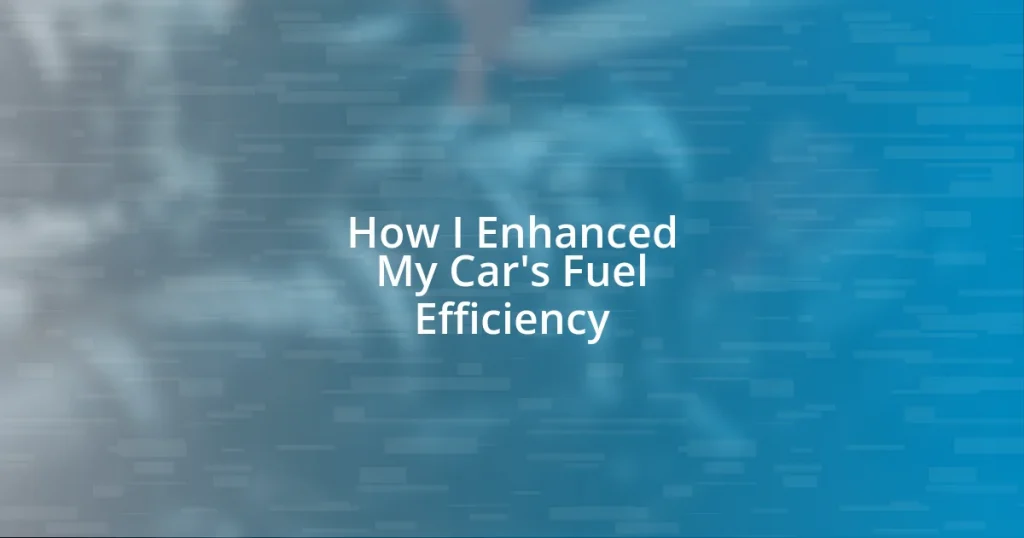Key takeaways:
- Enhancing fuel efficiency saves money and reduces harmful emissions, improving overall driving experience.
- Basic maintenance, such as regular oil changes, tire pressure checks, and air filter replacements, significantly boosts fuel economy.
- Adjusting driving habits, such as steady acceleration and reducing idling, leads to substantial fuel savings over time.
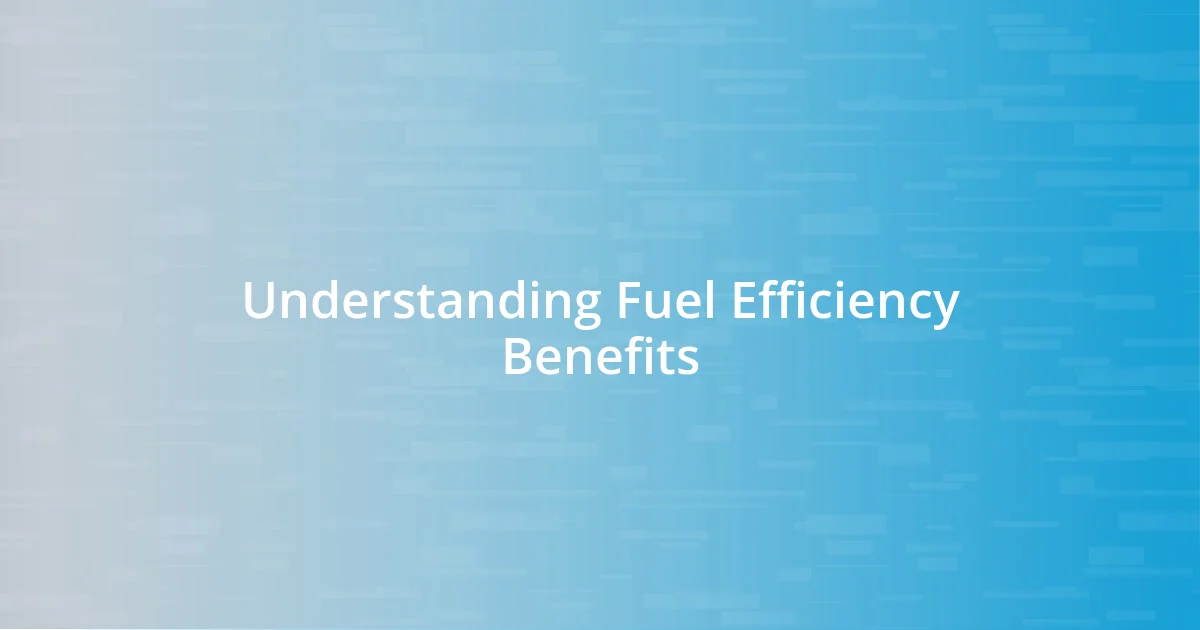
Understanding Fuel Efficiency Benefits
When I first started to really pay attention to my car’s fuel efficiency, I was amazed at the difference it made in my overall driving experience. I remember the day I filled up my tank and noticed that I could go an extra 50 miles compared to my usual routine. That little victory felt not only rewarding but also gave me a boost in confidence, knowing I was doing something good for both my wallet and the environment.
It’s fascinating to realize how enhancing fuel efficiency doesn’t just save money; it contributes to reducing harmful emissions. Have you ever thought about how many harmful substances get released into the air because of inefficient cars? Each time I drove my more fuel-efficient vehicle, I felt a sense of accomplishment, knowing I was making a positive impact, however small, on our planet.
Moreover, improving fuel efficiency can lead to a more enjoyable driving experience. I found that with better mileage, I was less anxious about fuel stops during long journeys. Isn’t it freeing to drive with the knowledge that you can go further, explore more, and truly enjoy the travel experience? Making conscious choices in my driving habits transformed my adventures on the road into something more than just a commute; they became a journey toward sustainability.
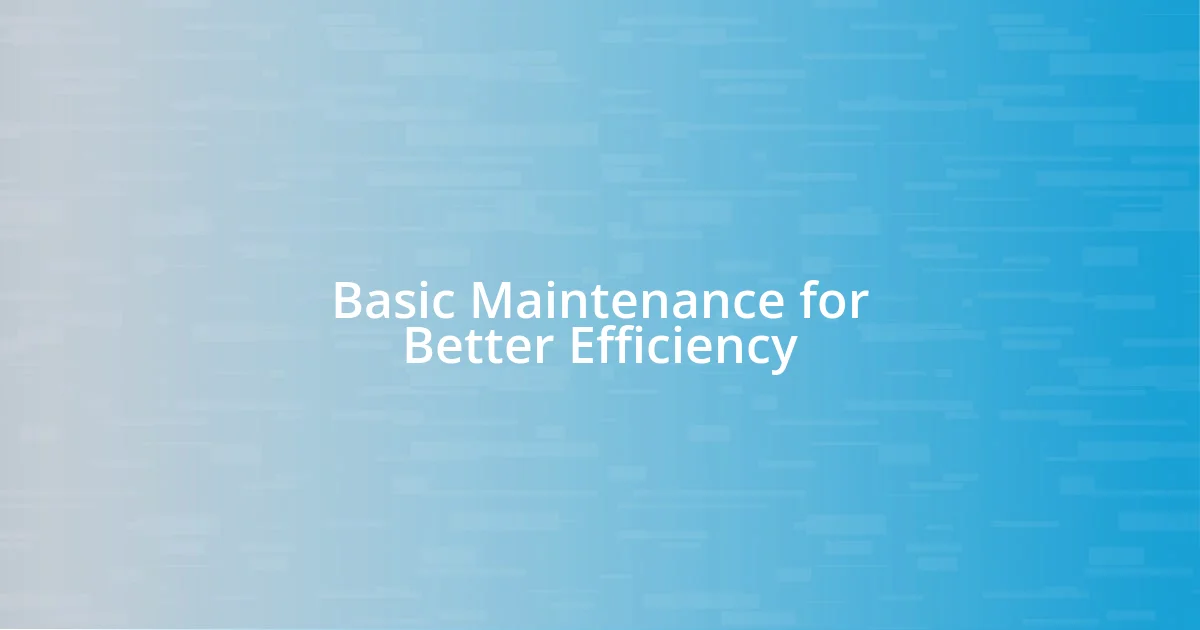
Basic Maintenance for Better Efficiency
When it comes to enhancing fuel efficiency, basic maintenance is a game changer. I remember how, after a simple oil change, my car felt as though it had regained its youthful vigor. Regularly checking and changing the oil not only keeps the engine running smoothly but also plays a crucial role in improving gas mileage. It’s one of those tasks that might seem minor, but it delivered noticeable results right away.
Tire pressure is another often-overlooked aspect of basic maintenance. One day, while preparing for a long trip, I decided to check the tire pressure. I was shocked to find that all four tires were under-inflated. After inflating them to the recommended levels, I could literally feel the difference. The car handled better, and it felt more responsive on the highway. Keeping tires properly inflated not only helps with fuel efficiency but also extends the life of your tires, so it’s a win-win.
Lastly, don’t underestimate the importance of air filters. I recall neglecting my air filter for way too long—thinking it was just another thing on the to-do list that could wait. But once I finally replaced it, the boost in engine performance and fuel efficiency was remarkable. A clean air filter allows the engine to breathe better, optimizing combustion and enhancing fuel economy. Simple maintenance tasks like these may seem trivial, but they can leave a lasting impact on both your pocket and the environment.
| Maintenance Task | Benefits |
|---|---|
| Oil Changes | Improves engine performance and gas mileage |
| Tire Pressure Checks | Better handling and extended tire life |
| Air Filter Replacement | Enhances engine efficiency and fuel economy |

Choosing the Right Fuel Type
Choosing the right fuel type can significantly impact your car’s performance and efficiency. I’ll never forget the moment I switched from regular unleaded to a higher octane fuel. It felt as if my engine gave a satisfied purr, almost as if it were thanking me for the upgrade. In addition to better performance, I noticed a slight improvement in my mileage. It was a small change, but those extra miles on each tank made a big difference over time.
Here are a few considerations when selecting your fuel type:
- Octane Rating: Higher octane ratings prevent knocking in high-performance engines, enhancing overall efficiency.
- Manufacturer Recommendations: Always check your vehicle’s manual; using the recommended fuel leads to optimal performance.
- Ethanol Blends: Be cautious with high ethanol blends, as they can sometimes reduce fuel economy in certain vehicles.
Choosing wisely not only makes your car run better but can also transform your driving experience into something more enjoyable and less stressful. It’s rewarding to feel the impact of your choices every time you hit the road.
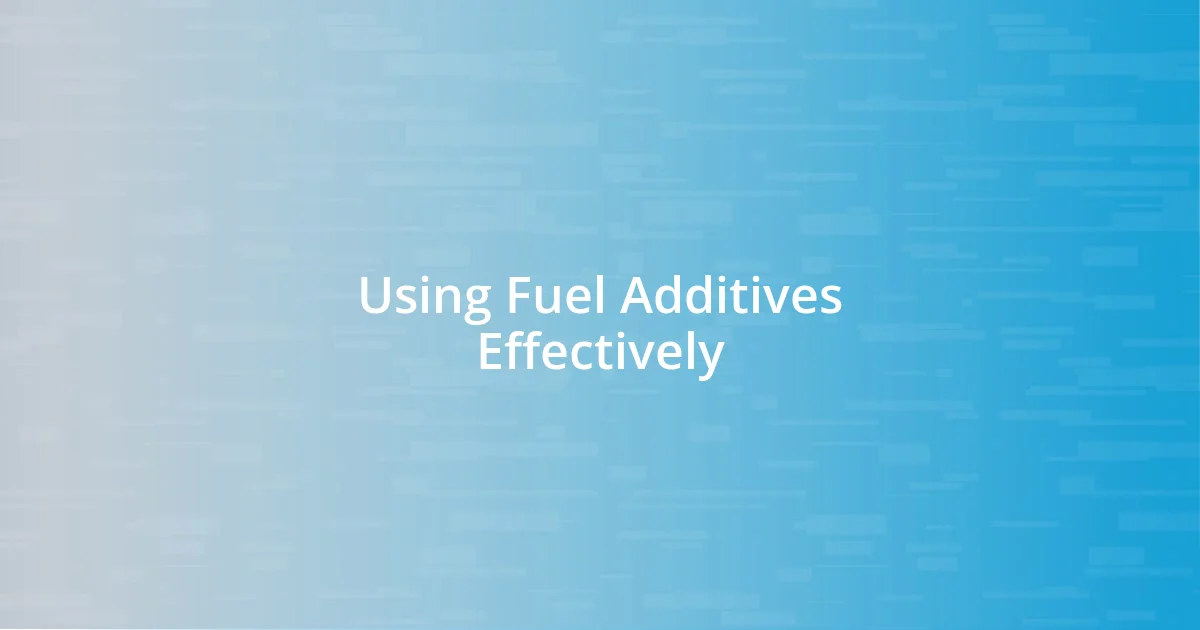
Using Fuel Additives Effectively
Using fuel additives effectively can truly transform your driving experience and fuel efficiency. I remember the first time I decided to add a fuel injector cleaner to my gas tank. The instructions on the bottle seemed straightforward, but the results were anything but ordinary. After just one tank, I noticed smoother acceleration and a noticeable reduction in engine noise. It felt like my car was getting a much-needed detox!
I often get asked if these additives really work, and my answer is an enthusiastic yes—when used correctly. It’s important to follow the manufacturer’s recommendations for frequency and dosage. I learned this the hard way when I added too much of an octane booster during an ill-timed road trip. My car jumped from a smooth ride to a choppy struggle, and let me tell you, it was an eye-opening experience! Understanding the right balance makes all the difference, allowing you to truly harness the benefits of fuel additives without overdoing it.
Additionally, being selective about the types of additives can lead to significant long-term benefits. For instance, I discovered that using a top-tier detergent gasoline had a positive effect on my engine’s cleanliness. Transitioning to this type of fuel made a noticeable impact in the way my engine performed over time. It’s these little choices that accumulate, leading to overall savings and satisfaction. Have you ever considered how something as simple as a fuel additive could rejuvenate your vehicle? It’s worth exploring, and you might be pleasantly surprised by the results.
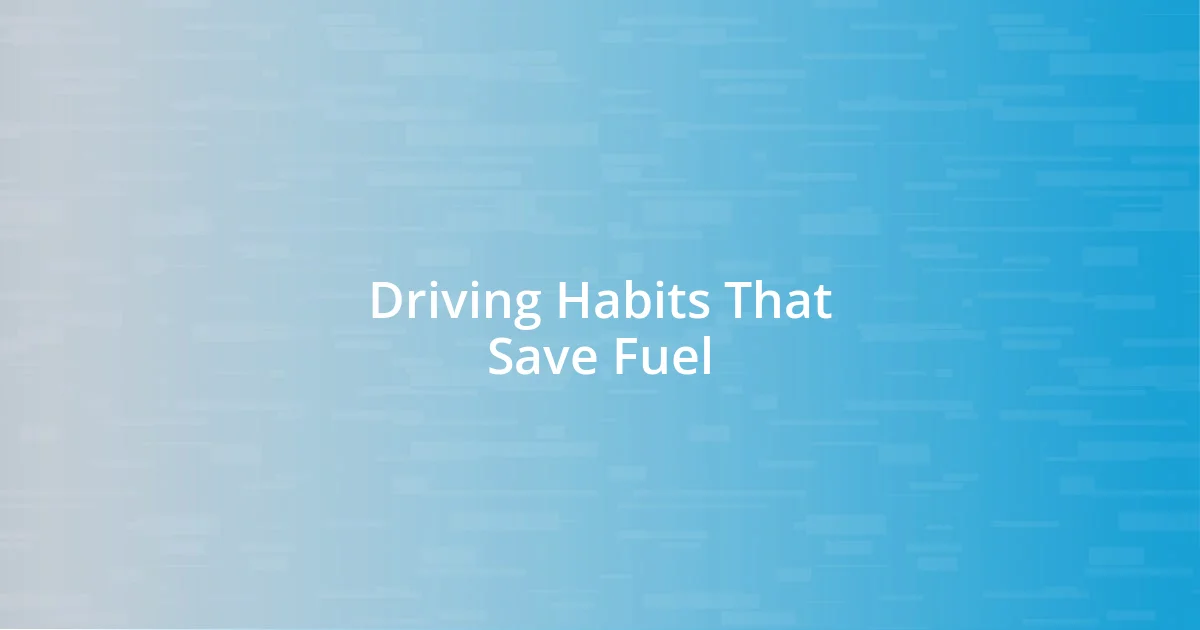
Driving Habits That Save Fuel
Navigating the roads with fuel-efficient habits can really make a difference. I once realized that my tendency to accelerate rapidly from stoplights was costing me more at the pump. Now, I consciously ease into my acceleration, and it not only saves fuel but also makes for a smoother ride. Can you believe how something as simple as driving style can alter fuel consumption so drastically?
Another small adjustment that dramatically improved my fuel efficiency is maintaining a steady speed. I found myself frequently checking my speedometer on longer trips to avoid unnecessary fluctuations. This habit has not only decreased my fuel consumption but also made my drives more enjoyable. Have you ever noticed how a consistent speed can turn a stressful journey into a zen-like experience? It certainly transforms the way I approach longer drives.
Lastly, I made a concerted effort to reduce idling time. In the past, I often left my car running while waiting for friends or at drive-thrus. Understanding that idling wastes fuel unnecessarily was a game changer. Now, I turn off the engine whenever I expect to be stationary for more than a minute. It’s quite satisfying to know that these little choices pile up, adding up to significant savings over time. What habits have you adopted that you didn’t realize were draining your fuel?
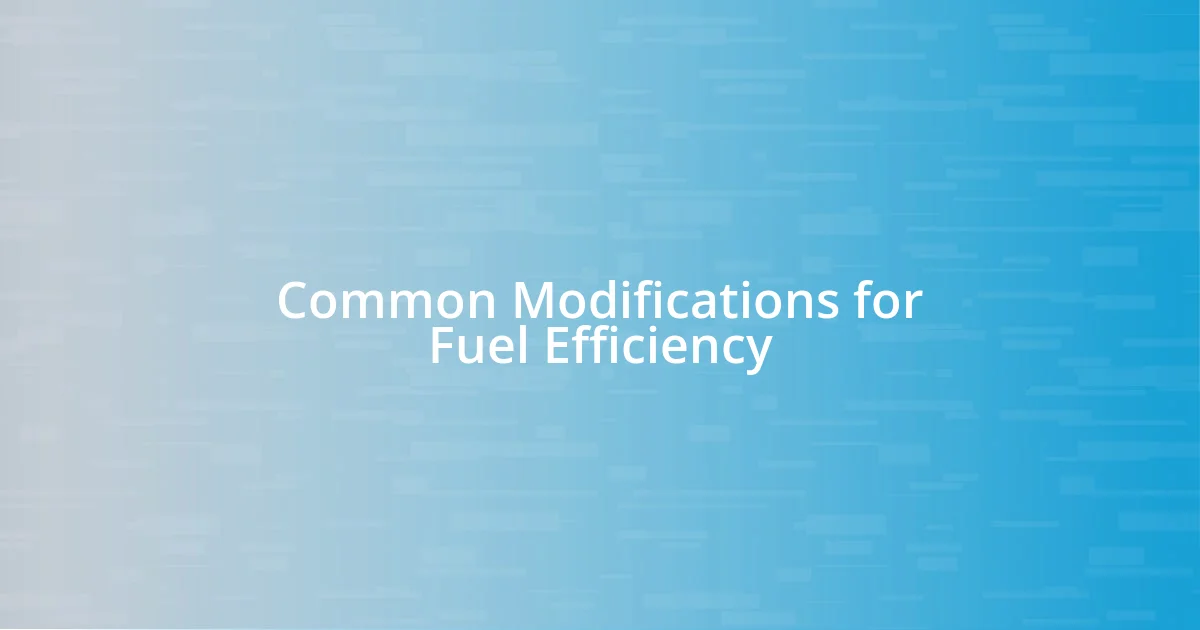
Common Modifications for Fuel Efficiency
One of the first modifications I made to boost my car’s fuel efficiency was upgrading to a high-performance air filter. I remember the day I decided to swap out the factory filter; it felt like I was opening the lungs of my vehicle. The difference was palpable—improved airflow not only enhanced engine performance but also resulted in better fuel economy. Have you ever thought about how something as simple as breathing easier could benefit your car?
I also took a leap and installed low-rolling-resistance tires. At first, I was skeptical about their impact on fuel efficiency; however, the moment I felt the smoother ride on the first drive, I was convinced. These tires reduce friction on the road, helping my car glide more efficiently. It got me wondering: isn’t it fascinating how one change can transform the relationship between your vehicle and the pavement?
Lastly, I invested in a lightweight aftermarket exhaust system, which I never anticipated would have such a huge effect. The enhanced flow not only gave my engine a bit more pep but also improved the overall fuel economy. It’s like my car was thanking me for freeing it from its restrictions! Have you ever considered how your exhaust system could hold your car back? It made me appreciate how even small tweaks can add up to big changes in efficiency over time.

Evaluating Results and Adjustments
After implementing my changes, the moment of truth arrived: it was time to evaluate the results. I remember brimming with anticipation as I observed my fuel gauge gradually dropping more slowly than before. Querying myself, “Is this really working?” pushed me to keep meticulous track of my mileage and fuel purchases, and I was thrilled to see a consistent uptick in my car’s efficiency.
I also found it essential to pay attention to my driving behavior following these adjustments. Reflecting on this journey, I realized how much my conscious choices shaped my fuel efficiency. At one point, I did a little experiment by disconnecting my fuel consumption tracking app for a week; the result was eye-opening. My fuel efficiency dipped, and it made me appreciate how data can illuminate habits I hadn’t even noticed before. Isn’t it surprising how easy it is to revert to old ways when we stop tracking our progress?
As I continued to tweak various aspects of my driving and vehicle, I kept asking myself, “What else can I adjust?” It became a fun challenge to explore how even minor modifications, like adjusting tire pressures or experimenting with different fuel brands, could yield improvements. Each small success ignited my passion further, showing me that the journey toward enhanced efficiency is an evolving process rather than a one-time fix. How aware are you of the ongoing adjustments you could make for even greater savings?

